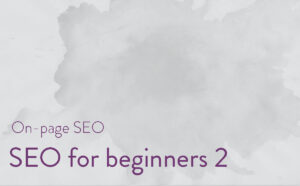18th Dec 2020
Off-page SEO

Welcome to the final in our series of search engine optimisation “how to” guides. If you have been following our progress through the world of SEO, then hello again. If you are a newbie, then it’s great to have you.
Keeping it nice and simple is our thing, so these guides are the ideal place to start. If you enjoy this, then why not check our some of your other guides in the series:
This week we’re shining a light on off-page SEO. As the name suggests, this is the stuff that takes place away from your website. It requires you to reach out beyond your site to build relationships with other actors on the internet. These relationships can feel like the natural marketing activities of a business anyway. The upside of this is that you’re also making a positive impact on your search engine ranking.
What is off-page SEO?
Off-page SEO is the skilful art of driving traffic to your website by establishing its relevance and authority.
This is achieved by having other reputable sources linking back to your website. In that way you are being validated by an already established authority, and search engines like that. Off-site SEO is also driven by any other activity that points users to your site, for example content shares on social media.
Backlinks are the way forward
Search engines use backlinks as a way of establishing a site’s quality. So they will calculate how many backlinks a site receives, and then rank it accordingly. The key thing here is that it will weight the links (called equity) according to their authority. So one link from a site like the BBC will be worth much more than 10 other less authoritative sites.
Backlinks are broken down into three main types:
- Natural links – these are links ordinarily provided in an article or post. PR articles or thought leadership articles are ideal for this
- Manually built links – these are obtained by consciously asking sites to link to you. For example you might ask customers or partner sites to link to your website
- Self-created links – are achieved by adding links to your site to online forums, directories, forums or blog comments. These can sometimes be viewed as spam, so tread carefully with this type of backlink
Some websites are more equal than others
As we mentioned earlier, backlinks are prioritised by their authority and relevance. Certain links will be viewed as being more relevant than others, and therefore will improve your ranking. This is called equity.
There are a number of key factors that contribute to the calculation of equity:
- Relationship between the linking site’s content and the content of your site
- Newness of the link
- Quality of the anchor text in the link – these are the actual words used to link to your site. There are best practice rules about how links are put together. Search engines prefer links that are short, relevant, not generic and accessible
- Trustworthiness of the linking site
- Popularity of the linking site
- Quantity of links on the linking site’s page
When is a link not a link?
The final element of off-page SEO is the ranking of your site by any other activity on the web. This is basically any energy around your site that illustrates its relevance. This can include:
- Social media activities
- PR articles
- Thought leadership articles
- Guest blogs
- Influencer mentions
It’s worth mentioning here that these can often take the form of a backlink anyway. So the rules we mentioned above will apply here too.
Measuring success
One useful way to keep an eye on the effectiveness of your SEO is to use Google Search Console. This tool will help you monitor the performance of your site and help you to optimise your content further. It’s a great source of data on your site’s SEO and one that we’d recommend you take a look at.
The takeaway
Off-page SEO is all about establishing good, credible relationships with other like-minded websites, social media influencers, articles and blogs. However, be careful to try and choose those which are seen as being most relevant and knowledgeable to the topic or industry you are in. By doing so you stand a far better chance of improving your ranking.
As we said back at the beginning, this all seems like sound marketing sense. And it’s true. SEO is digital marketing, so reaching out to similar and established partners online is a productive thing to do. Just remember to choose those that are going to increase your ranking.
So, along with the on-page SEO we’ve mentioned in our previous posts, this guide should really help to improve your rankings. Search engine optimisation is a complex beast, and it’s something that’s ever evolving. Our advice is to build simple SEO into your processes and you’ll start to reap the rewards.
If you want to find out more about how we can help with your SEO, then contact us.